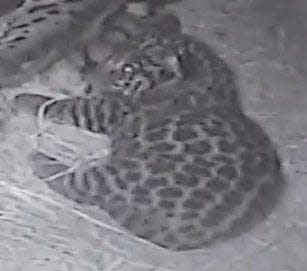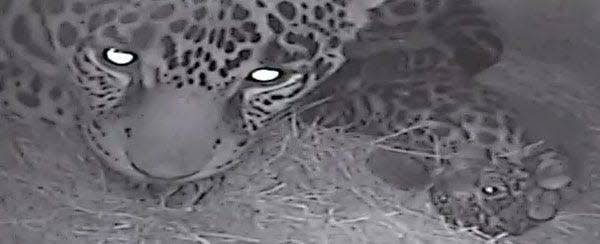Check out the newest jaguar in town: First new cub born at Jacksonville zoo in 10 years
- Oops!Something went wrong.Please try again later.
Another jaguar has arrived in Jacksonville, but this one won't be on the football field.
In April the first jaguar cub born at the Jacksonville Zoo and Gardens in almost 10 years joined first-time parents Babette, 6, and Harry, 14. The cub's gender is undetermined and it has not been named.
The last jaguar cub born at the zoo was Khan, a male, in July 2013. He was named for Jacksonville Jaguars owner Shad Khan, with whom he shares a birthday.
Zoo redesign: Jacksonville Zoo looks to add new manatee, lion exhibits in $50 million project
'First of its kind': Jacksonville Zoo's new entrance will welcome guests with state-of-the-art video boards
"We are ecstatic that Babette is doing an excellent job taking care of her cub who is active and healthy," said David Hagan, chief life sciences officer. "It is not uncommon for first-time mothers to reject their cubs, so we are very pleased that Babette is caring for the cub instinctively. This is an exciting time and we are thrilled for the community to join us in celebration."
For the time being, the new cub will not be on public display but continue to bond with Babette behind the scenes. A video stream of the cub den will be available to watch in the zoo's Lost Temple exhibit.

"It is important for first-time moms to be able to bond with their cubs without outside disturbance," said Sheryl Staaden, curator of mammals.
A jaguar’s pregnancy lasts about 14 weeks. Cubs typically weigh about 2 pounds at birth and are born blind but can see after two weeks, according to the zoo. "The cub reached an important milestone by opening its eyes to reveal a beautiful blue-gray color," Staaden said.
Awww! Cute and critically endangered baby lemur born at Jacksonville Zoo and Gardens
Steve the cheetah: Beloved but in declining health, cheetah humanely euthanized at Jacksonville Zoo and Gardens
In the wild, jaguar cubs are taught to hunt by their mothers at about 6 months old. At age 2, the cub leaves to live on its own. "Jaguars are solitary creatures that only spend time together to mate," according to the zoo.
The largest cat in the Americas and the third largest in the world behind lions and tigers, a full-grown male jaguar can weigh 125 to 250 pounds, a female 100 to 200 pounds. Most have yellow or orange coats with dark spots, but a rare few have black coats with spots.
"Each jaguar’s spot pattern is unique, like a fingerprint, with circular spots that have spots in the center, called rosettes," the zoo said.
Their range is the Southwestern United States and Mexico south through Central and South America. They live in tropical rainforests, grasslands and deserts and are the top predators in their habitat. Still, jaguars are designated as "near threatened" because of habitat loss: Humans are the biggest danger to their survival, according to the zoo. In recent years, only one male jaguar has been spotted in the wild in North America.
May help species survive: Critically endangered Malayan tiger latest new arrival at the Jacksonville Zoo
Screams and gunshots: How a Jacksonville zookeeper survived a horrific black bear attack
In addition to providing a home for the new cub, the zoo is helping to protect other jaguars in Guyana.
It partners with the Rupununi Wildlife Research Unit in the Rupununi Region of Guyana in South America, where the expansion of cattle ranching has created conflict between people and jaguars, which are naturally skilled hunters of livestock.
The research unit is primarily operated by local Guyanese staff and Matt Hallett from the University of Florida’s Wildlife Ecology and Conservation Department. They partner with villages, private ranches, regional groups and government agencies, among other entities, "to create local solutions to decrease the … conflict and produce new management tactics and collaborations that benefit both people and jaguars," according to the zoo.

"The loss of cattle by jaguar hunting can directly impact the community’s access to daily resources, resulting in sometimes harsh responses, which increase the endangerment of the species," the zoo said.
The 100-year-old zoo is at 370 Zoo Parkway and has about 2,000 rare and exotic animals and 1,000 species of plants, with the largest botanical garden in Northeast Florida. The zoo is a nonprofit and a portion of ticket proceeds go to 45 conservation initiatives in the area and around the world. For advance tickets and more information, go to jacksonvillezoo.org.
bcravey@jacksonville, (904) 359-4109
This article originally appeared on Florida Times-Union: Jacksonville zoo welcomes first jaguar cub in 10 years
